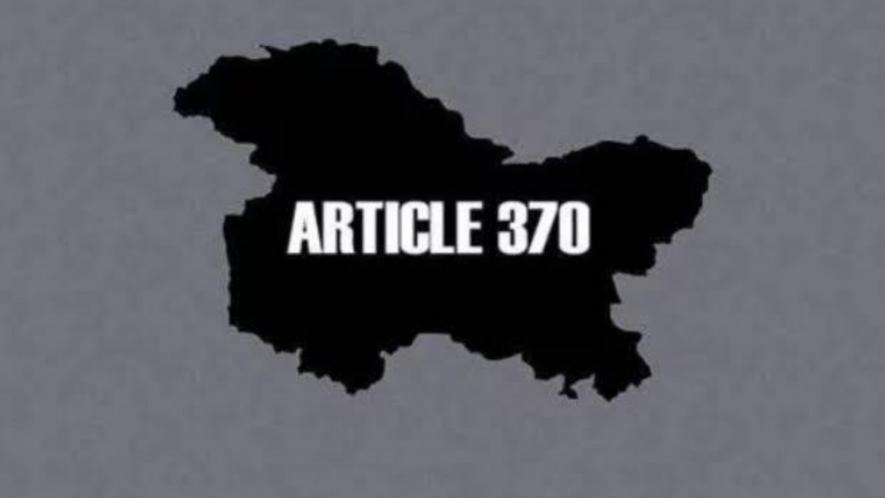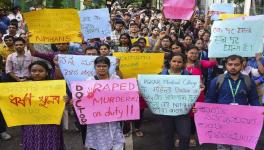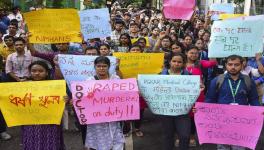Art 370 Revoked Lifeline of Kashmir’s Women Abuse Survivors

File Image
Whenever Nadia awakes late, her husband beats her up with his belt and sometimes slaps her. Nadia got married in 2017 and has faced domestic violence daily. “I have two children; my father died a year ago. We have two sisters with one differently-abled brother. Where shall I go?” Nadia says.
Nadia’s husband runs a grocery store in the Srinagar district. She says he has been indebted for many years and demands she bring money from her parents to repay all his debts, including from friends.
The Kashmir valley, once considered a haven for women, has seen a steep rise in violence against women in the last few years. The survivors cannot turn to anyone with their grievances because there is no platform to hear women’s complaints.
After the abrogation of Article 370 in 2019, the Bharatiya Janata Party-led central government abolished the Commission for Protection of Women and Child Rights and six other commissions.
As the months passed, Nadia’s friends convinced her to complain about her husband’s high-handedness and abuse. Ultimately, she did make her mind up to file a case at the State Commission for Women in Srinagar—but that was just before it was disbanded.
Nadia never complained to the police, believing, like many women in Kashmir, that it might give her a bad name.
With the State Commission for Women gone, Nadia’s hopes for justice also vanished. “I would complain against my husband at the police station, but hesitate due to the lack of women police officers,” Nadia told this reporter.
The Kashmir valley has witnessed horrifying crimes against women in recent years. In March, Shabir Ahmed Wani, a carpenter, killed a 30-year-old woman in the Ompora locality of the Budgam district. The accused chopped her body into pieces and dumped them at different places in a macabre bid to escape detection.
In 2021, a study by BMC Women’s Health, a journal dedicated to the health and well-being of women, analysed the prevalence of domestic violence in India between 2001 and 2018. It found Jammu and Kashmir among five states reporting a 160% increase in the reported crime rate under ‘cruelty by husbands and relatives’.
The report also found a 53% increase in this category of crime over 18 years, indicating that the higher reporting of such crimes is not a blip but an established trend.
The 2021 report showed that 11% of married women in the erstwhile state experienced physical or sexual violence, and the husband was typically the perpetrator. The 2015-16 and 2005-06 reports showed the percentage was 12% and 13%, respectively.
In the National Family Health Survey Report 2015-16, 57.5% of women aged 15-19 in Jammu and Kashmir said a husband was justified in hitting his wife for reasons like disrespecting her in-laws (44%), arguing with him (38%), for neglecting the household and children (37%) or if he suspected her of being unfaithful (25%).
The latest report, released in November 2021, shows the percentage of women who justified the crime of wife-bearing has decreased significantly to 47.6% but remains high.
Male-dominated Police Stations
Mehar Zargar, a budding journalist from Srinagar, says women in Kashmir don’t trust the criminal justice system or police and, therefore, hesitate to report harassment or violence. “They fear their complaints may not be taken seriously or that they may face victim-blaming. They also fear retaliation from the perpetrator and don’t trust the police will rescue them,” she says. Zargar says that some women do report such crimes, but many more go unreported due to cultural or social norms that discourage women from seeking help or even discussing such incidents.
One evening this March, Mehar experienced horrific harassment while returning home from work. A young man followed her in his car and cat-called, but before she could seek help, he got out and blocked her way. He grabbed her hand and tried to snatch her phone, making her feel imprisoned and helpless. “I managed to free myself from his hold and fled from the spot,” she says.
Mehar shared the horrifying incident on X (formerly Twitter) the same evening. She received phone calls from the Police Control Room in the Baramulla district and the Senior Superintendent of Police in Srinagar. But, though the experience left her feeling terrified, the weight of social pressure made her choose not to pursue the case.
On 22 August, the Principal Sessions Judge, Srinagar, Jawad Ahmed, sentenced two men to life imprisonment for having perpetrated an acid attack on a young law student. The public appreciated the police’s role in the investigation, but Mehar believes restoring trust in the police is a complex process that requires consistent effort.
“I don’t think this judgment will encourage other women to report crimes against them because it took around nine years to get justice in this case. A single conviction in a decade does not have any effect on the public,” she says.
Rising Crime Graph
The National Crime Records Bureau (NCRB) reported a 15.2% growth in crimes against women in Kashmir in 2021. The report revealed 3,937 cases in 2021 compared with 3,405 in 2020 and 3,069 in 2019. The report shows more than 7,000 arrests but an abysmal conviction rate—only 95 people were convicted.
The NCRB report revealed 315 cases of rape, 1,414 incidents of attempted rape, and 14 dowry deaths were lodged in 2021. Notably, 91.4% of the rape accused were known to the victim.
Even the 2011 Census found 64 lakh women in Jammu and Kashmir and a crime rate per lakh population in 2021 at 61.6 per 1,00,000.
Nayeema Mehjoor, former chairperson of the Jammu and Kashmir State Commission for Women, says the government is not interested in women’s safety or their other concerns. She says crimes against women in the Valley surge with each passing day due to their apathy.
“Jammu and Kashmir is the only state [Union Territory] without a women’s commission. As a result, there is too much suffocation inside and outside the home—most women in Kashmir do not prefer to go to the police station to lodge FIRs due to stigma and lack of confidence in the police,” says Mehjoor.
Women’s rights activist Rashida Nazir says the victims of domestic violence considered the Women’s Commission a meaningful alternative to a police investigation—or silence. Women could report abuse without hindrances at the commission dedicated to such issues. But since the commission no longer exists, the police stations are their only recourse, which women do not trust.
TeleManas Reveals More
A call centre launched by the Ministry of Health and Family Welfare in Srinagar last October to provide mental health services to the public got a rush of women callers. “Women make 70% of the distress calls seeking mental health assistance in Jammu and Kashmir. Domestic violence makes women more susceptible to stress and a mental health crisis,” says a counsellor at the Tele MANAS helpline who wishes not to be named.
Dr Mehak, a regular counsellor at Srinagar’s Tele MANAS, told this reporter that after the women’s commission was disbanded, they received hundreds of daily phone calls from female domestic violence victims.
According to patients examined by the institution, women in Kashmir suffered in silence through the armed conflict in the valley, which worsened their mental health.
The TeleManas Centre is located in Srinagar at the former Psychiatric Diseases Hospital, now known as the Institute of Mental Health and Neurosciences (IMHANS). Its toll-free phones keep ringing, and counsellors advise callers in Kashmiri and Urdu.
“Jammu and Kashmir is the only state with two mental health facilities centres, in Srinagar and Jammu city. People in remote areas can also call counsellors anytime during the day or night, even for domestic violence-related cases,” Mehak says.
Compared with other regions of the country, the issues in Kashmir are considerably more serious. The erstwhile state is among the top three states in terms of the number of calls it receives for mental health difficulties despite its smaller population than other significant states. Maharashtra and Tamil Nadu are the other two states.
The author is an independent journalist based in Jammu and Kashmir. The views are personal.
Get the latest reports & analysis with people's perspective on Protests, movements & deep analytical videos, discussions of the current affairs in your Telegram app. Subscribe to NewsClick's Telegram channel & get Real-Time updates on stories, as they get published on our website.
























